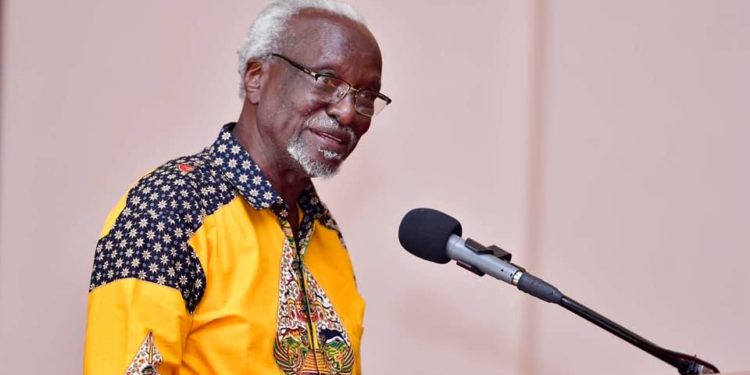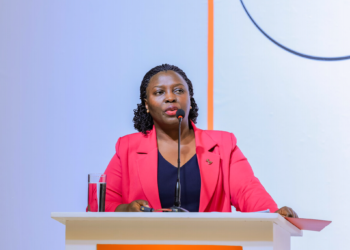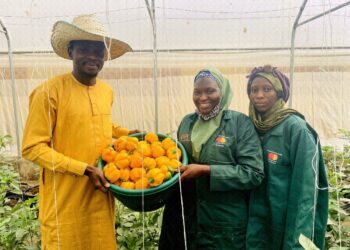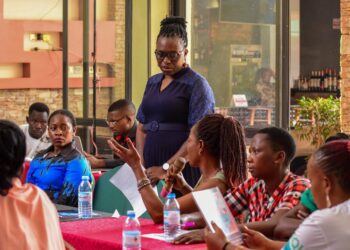The announcement of the death of Museveni’s perennial political mentor and mentee Ali Muwabe Kirunda Kivejinja marked the end of a colourful career in serving humanity by a man who dedicated his entire life towards serving his country unreservedly.
At the time of his death, Kivejinja left behind a legacy he concisely smiled over in amusement after decades of unwavering sacrifice and dedication.
Speaking at the launch of President Yoweri Museveni’s 2021 reelection coordination team for Busoga Subregion on the 6 of september this year at Iganga Boys Primary School,the legendary politician took his fully attentive listeners through the long journey of the ruling establishment and lectured on why he had fallen out with the Obote group.
He specifically emphasised that Ugandans should fgorever walk with their heads up for the sacrifices of his generation had brought the fruits of peace and freedom which was unfortunately being misused.
Seeming like he was foretelling his imminent call to heaven, Kivejinja appealed to the younger population at the gathering to take upon themselves the responsibility of guarding the revolution he and his comrades in Luwero had achieved by sweat and blood.
He proudly remarked that he was content a lot had been achieved but other objectives such as Pan Africanism and Regional integration looks like would not be achievable under their generation hence a call to the younger members of the movement to pick up from where they would stop.
LIFE AND CAREER
Although the fallen Musevenist is commonly associated with Bugweeri where he made his mark in representative politics as area MP between 19996 and 2001, there is a ;lot more about him and Kamuli that is publicly known.
Former Kamuli District LCV Chairman Fredrick Bangu says the iconic figure could have actually been born in Kamuli at Nawantumbi village Nawanyago Sub County in Kamuli District. He says that his late father Muwabe Kivejinja had been deployed in Kamuli as Muslim teacher at Nawango during the colonial times.
While on duty in the rural parts of Kamuli, Kivejinja senior married Aisa Naigaga -Kirunda Kivejinja’s mother and and then bought land in Nawantumbi along the Kamuli – Jinja Highway before they begot the son that would later turn into a true legend.
Being a muslim in a socierty that was administratively and socially dominated by christianity, the young Kivejinja found it nearly impossible to access formal education despite coming from a quite previlaged family.At the time, conial institiutions normally demanded that a parent first converted to Christianity before having theor children accepted in the mission schools of the time.
The ardent Moslem Kivejinja was however not bothered.He was rather determined to keep his son a moslem at any cost and thus enrolled him for elementary Islam as he mapped outy strategies of helping him attain formal education.
In his book ‘The sapoba Legacy, KK details his ancestral story as having come from
“ Aristocracy to Democracy.”
He says he was born in 1935, to Muwabe Kivejinja, a son of Kirunda – the son of Nkuutu. Nkuutu was the son of Kibbeedi, who himself was a son of Kakaire who came from Bunyoro kingdom.
Magoola, the father of Kakaire, was the son of Nyamutukura Agutamba, the Omukama of Bunyoro. Kirunda, a prince from the royal family of Bugweri in Busoga, says his mother Aisa Naigaga has descendants who hail from Bunyoro.
He went to Bukoyo primary school, before joining Kibuli Junior School in Kampala from wherebe bonded with former Presidential Candidate Jabeeri Bidandi Ssali in 1952. From Kibuli, Kirunda joined Busoga College Mwiri – one of the most powerful schools in the country at the time for his higher education before he left for Delhi University, in India in 1957, where he bonded with Kintu Musoke, another nationalist with whom they would do great things to shape the country’s political history in the subsequent years. He holds a Bachelor of Science in Zoology.
POLITICAL CAREER
The politics in the fallen political hero is said toi have been born during his time in India where he had gone to pursue further studies.
Untill then, Kivejinja’s only dream was to excell in the field of medicine but his views would drastically change after who was elected leader in the then African Students Union which placed him in a position to intarract with some of the other students that would later form a great component of the force that demanded self determination from colonial domination.
While serving in the capacity there, he made many future African leaders like Kenneth Kaunda of Zambia, Julius Kambarage Nyerere of Tanganyika, Kwame Nkurumah of Gold Coast, Bingu Wa Mutharika of Malawi among others, as well as Cuba’s Fidel Castrol and Nikita Khrushchev of Rusia, both strong communists that would greatly shape a clear picture of his subsequent brand of activism in the years that followed.
“I was introduced to an international centre, where we constantly interacted with different people and I began to recognize the curse of imperialism, how it had held our people back, and the need to fight it,” KK writes.
Coming into contact with such leaders with communist ideals enticed him towards Socialism. I t is thus not surprising that on his return to the country, he named his first son, the late Lumumba Kakaire, after Patrice Lumumba, the first post-independence leader of Zaire now DR Congo. In 1961, when Lumumba was executed.
Lumumba, ann iconic defender of Pan Africanism was executed in 1961 and his death is said to have irked the young Kivejinja to the marrow, prompting hiom to organise a protest match in Delhi against the Beligian and American administrations who were grossly accused of being behind the heinous act.
KK’s communist beliefs and dislike for western imperialism influenced him to lead an assault on enemy embassies in 1962 soon after Uganda got its independence.
“After getting the certainty of the hoisting of the Ugandan flag and the downing of the British flag, we were assured that now Uganda was a free and independent country…I organized some of our youths, who moved clandestinely to the American embassy and stole the American flag. They went on and stole the flags of all the nations we considered to be enemies of Uganda,” KK writes.
He says these radical actions saw him banned from travelling to the US until the 1990s when he was a Foreign Affairs minister in the NRM government.
KK made his first foray into Ugandan politics in 1961 as a UPC youth winger. He later became its secretary for research and in charge of the information bureau, before he was expelled from the party in 1965. While in UPC, KK used his communist links to introduce UPC leaders to Asia.
After leaving UPC in 1965, he took leave from active politics until 1980 when he participated in the formation of the Uganda Patriotic Movement that evolved into the NRM of today.
SERVICE UNDER NRA/NRM
Kivejinja is said to have been an integral component in P[resident Museveni’s political history, right from the early days under the now defunct Uganda Patriotic Movement[UPM] in 1980.
When Museveni took the decision in favor of a military challenge against the Obote II government that he accused of rigging the 1980 general elections, Kivejinja would follow him too.He was a member of the early Resistance Council which helped to organise the rebel movement’s administrative and social structure.
He would later run into refuge in Nairobi from where he continued publicising the the rationale of the rebellion against Obote II. His life in Nairobi was however shortlived due to threats from Obote’s agents on his life which forced him to flee to Austria from where he helped popularise the rebellion in Europe as a member of the NRM External Wing.
He was at the center of the transition of the NRM from the leadership of founding Chairman Yusuf Kironde Lule to the then commander of the Arned wing of the movement Yoweri KMuseveni in 1984 following the death of the former in England.
He returned to Nairobi after the fall of the UPC government in the 1985 coup and was a member of the NRM delegation at the Nairobi peace talks of 1985 with the Okello junta. He re-joined the NRA forces in Muchwa, Kabarole in August 1985 as the commissioner for finance in the NRM interim administration set up in western Uganda.
On capture of state power in 1986, he served both in government and at the movement secretariat emphasizing the ideological foundation of the NRM.
He lived his life as a Muslim intellectual, Leftist /socialist ideologue and African nationalist from the pre-independence era.
Late Hon. Kivejinja served the NRM government as Minister of Relief and Social Rehabilitation; Works and Transport, Minister Without Portfolio; Minister of State for Foreign Affairs; Deputy National Political Commissar; Second Deputy Prime Minister and Minister of East African Affairs.
He served as Constituent Assembly Delegate for Bugweri (1994-96) and MP Bugweri (1996-2001). Kirunda Kivejinja was however surprisingly unable to replicate his revolutionary antics in the country’s legislative politics as his only full term in the House came between 1996 and 2001 before he was ejected by current Bugweri MP Abdul Katuntu.
He leaves behind fourteen children and two wives, besides scores adopted under his care over the years.
Fare thee well legendary teacher. You will continue living through your unforgettable works that touched millions of souls.
Do you have a story in your community or an opinion to share with us: Email us at editorial@watchdoguganda.com













